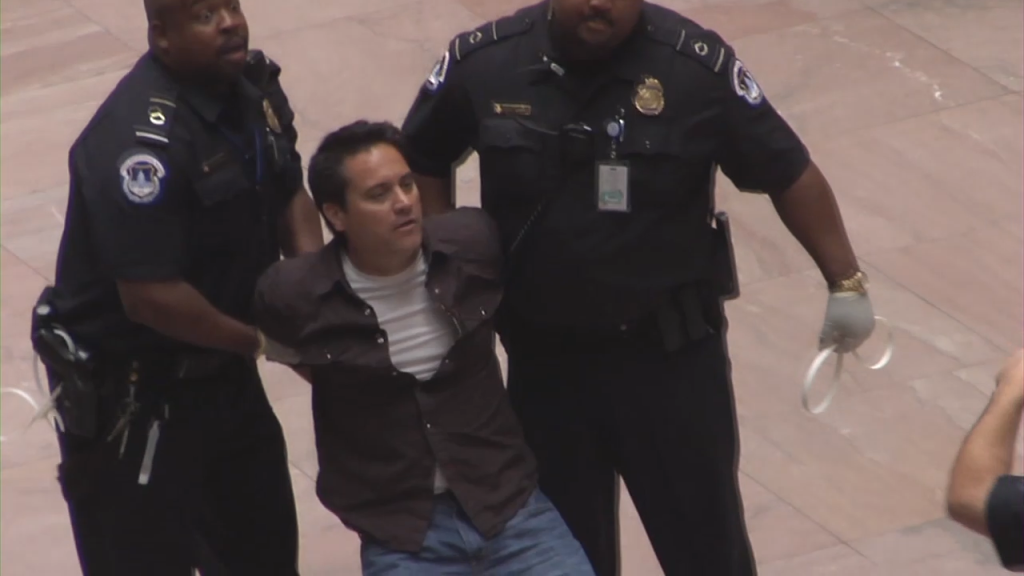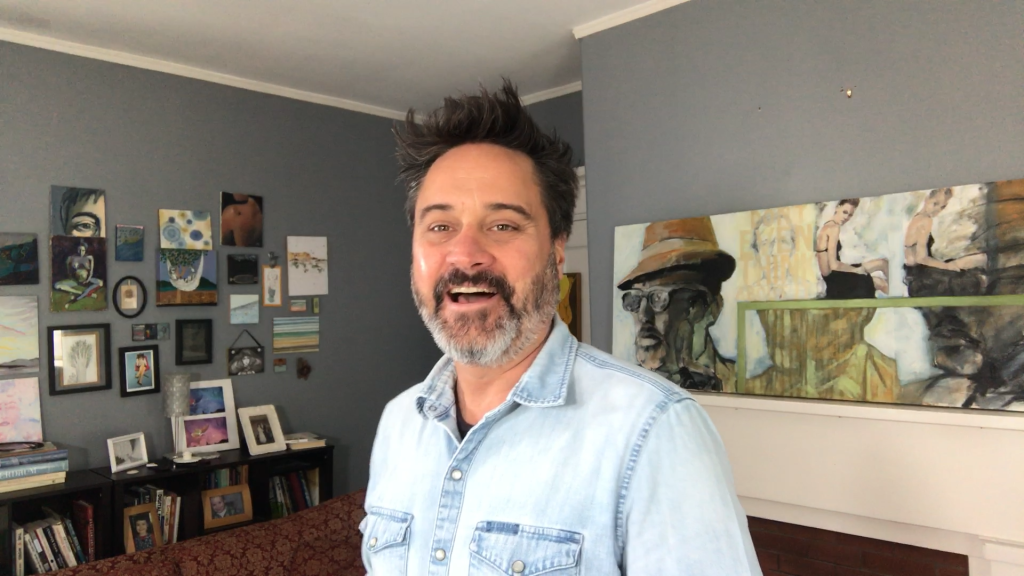
‘Manifest Destiny’s Child’ — Written and performed by Dennis Trainor, Jr.; Directed by Jeff Wise and Dennis Trainor; Presented by Acronym TV. Tickets are “pay what you will” with a $5 minimum, and can be purchasedhere: https://acronymtv.simpletix.com/e/60194. Manifest Destiny’s Child will stream on-demand October 24st — November 8th, 2020 here: https://acronymtv.org/mdc
by Shelley A. Sackett
‘Manifest Destiny’s Child’ is a dramatization of Dennis Trainor, Jr.’s true story about his personal involvement in all things social justice, from protesting at Standing Rock and Occupy Wall Street to his hosting and writing the nationally syndicated news and politics show Acronym TV to, ultimately, becoming Communications Director of Dr. Jill Stein’s ill-fated third party run for President in 2016.
Created as a memoir at Boston’s creative writing space, Grub Street, Trainor decided to morph the piece into a one-man show. While he and director Jeff Wise wisely interspliced actual footage from the protests and Stein’s campaigns, that footage spotlights Trainor, either as participant or interviewer. Coupled with the remainder of the 63-minutes that focuses on Trainor as a talking head either in emotive full face or — annoyingly — in static profile, that’s a LOT of on-screen Trainor, his Robert Downey, Jr./Matthew Perry appeal notwithstanding.
It’s hard to get a handle on Trainor’s point at first. We are introduced to his comfortable, well-appointed bourgeois lifestyle (love the art work!), his mid-life professional crisis and his inviolable weekly date nights with his wife. We also glimpse his rage and disappointment at “Trumplandia” and receive a history lesson on “Manifest Destiny,” the widely held 19th century American imperialist belief that American expansion throughout the continent was both justifiable and inevitable.
“How did we get into this Trump mess?” Trainor bemoans. “Inequality and poverty are not an accident. They are human made.”
Finally, some 20 minutes in, Trainor throws us a contextual lifeline. It is 2015 and, seemingly out of the blue, Dr. Jill Stein asks him to be her Communications Director for her presidential campaign. Trainor, flattered and relieved to have something meaningful to do with his life, accepts her offer. Nine months later, he quit but not before amassing a trove of frustrations and disappointments that he can’t wait to share.

The show sometimes feels like a TED talk, and perhaps that’s a venue Trainor should explore, since those parts of the piece feel most authentic and are most engaging. He holds forth on the history of third parties in American politics and the narrow but important victories they won, such as the end of slavery by the then third-party Republican party and women’s right to vote by the Woman Suffrage Party.
Yet, through the whining and misgivings, one can’t help wondering: Why did he work for Stein if he knew she would never be president? Why did she run if not to win?
Trainor’s point (and it is an excellent one) is that Stein should have set her sights on getting the Green New Deal passed rather than securing the presidency, which was completely beyond her grasp. However, she stubbornly stayed in the fray, eventually (in Trainor’s tortured mind) drawing enough votes away from Clinton to result in Trump’s victory. And he was her willing accomplice.
Although he quit Stein’s campaign after nine months, he returned a year later as an independent contractor handling her media (or “sales,” as he aptly puts it). Trainor feels residual existential guilt over his part in her toxic and unproductive run, and this is where the show changes tenor from memoir to chest-beating therapy, which is too bad.

Turns out, however, Trainor and Stein had more in common than not: they share an almost masochistic compulsion to make arguments and fight battles they are certain to lose. “Throwing sand at tsunamis,” he names it.
The piece does end on an upbeat note, heralding revolutionary struggles that can actually be won, like Occupy Wall Street and Standing Rock. Still, it’s hard not to worry about Trainor personally. If the 2016 election threw him into a tailspin of depressing hours spent on Facebook, Twitter and list making, how must he be coping with that scenario redux and COVID?

